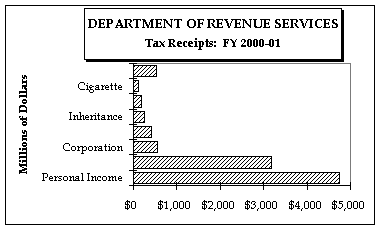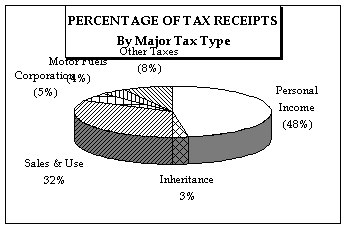2000/2001Section Connecticut Court Cases
CONNECTICUT SUPREME COURT
In Oxford Tire Supply, Inc. v. Commissioner of Revenue Services, 253 Conn. 683 (July 2000), the Connecticut Supreme Court ruled that the amendment of the definition of "hazardous waste" in Conn. Gen. Stat. §22a-115(1) by 1999 Conn. Pub. Acts 225, § 30 to specifically exclude scrap tires was intended to clarify, rather than to change, the definition of hazardous waste and that such amendment applied retroactively. Therefore, based on this amendment, the court found that scrap tires do not constitute hazardous waste for purposes of §12-407(2)(i)(I). The court also found that scrap tires are not "contaminants of air, water or soil" within the meaning of §12-407(2)(i)(I). Consequently, the court held that the taxpayer’s scrap tire removal services rendered during the six-year period from January 1, 1989 through December 31, 1994 were taxable.
In William R. and Marjorie Berkley v. Gavin, Commissioner of Revenue Services, 253 Conn. 761 (July 25, 2000), the Connecticut Supreme Court upheld the judgment of the trial court and held that the federal tax benefit rule is incorporated into the definition of "adjusted gross income" contained in Conn. Gen. Stat. §12-701(a)(19) and that the tax benefit rule did not apply to this case because the taxpayers did, in fact, derive a Connecticut tax benefit from losses generated and taken for federal income tax purposes in years prior to the enactment of Connecticut’s income tax (pre-1991).
In Andersen Consulting, LLP v. Gene Gavin, Commissioner of Revenue Services, 255 Conn. 498 (March 27, 2001), the Connecticut Supreme Court ruled that a consulting company’s development of customized computer software programs constituted taxable computer and data processing services subject to Connecticut sales and use taxes under Conn. Gen. Stat. §12-407(2)(i)(A) and Conn. Agencies Regs. §12-426-27(b)(1). Legislative amendments in 2000 to Conn. Gen. Stat. §12-407(2) were meant to clarify, rather than change, the meaning of the statute. The Superior Court’s decision was reversed and the case was remanded for further proceedings.
In Carpenter Technology Corporation v. Commissioner of Revenue Services, (Per Curiam) 256 Conn. 455 (June 19, 2001), the Connecticut Supreme Court affirmed the judgment of the Superior Court (Carpenter Technology Corporation v. Commissioner of Revenue Services, No. CV 98 04924298S (August 9, 2000)), which ruled in favor of the taxpayer. The Superior Court found that the taxpayer’s subsidiary, Carpenter Investments (CI), had economic substance and that the taxpayer’s $300,000,000 capitalization of CI and CI’s immediate lending of that $300,000,000 back to the taxpayer had a valid business purpose. The court held that the disallowance of the taxpayer’s interest expenses under Conn. Gen. Stat. §12-226a was unreasonable because the corporate arrangement between the taxpayer and CI did not result in an improper or inaccurate reflection of income.
CONNECTICUT SUPERIOR COURT (TAX SESSION)
In Charles J. Popple, Executor v. Commissioner of Revenue Services, No. CV 99 0497727S (July 26, 2000), the Superior Court held that the fiduciary of an estate was not personally liable for taxes allegedly unpaid by a decedent after the decedent’s estate has been completed and the assets distributed to the beneficiaries. The court concluded that the distribution of all assets of the estate was made in good faith, and therefore Conn. Gen. Stat. §45a-356 protects the fiduciary from personal liability following the distribution of the estate assets. The court further found that the claim of a late creditor is not extinguished, but instead the creditor may pursue his rights and remedies against the distributees of the estate.
In Saveway Petroleum, Inc. v. Gavin, No. CV 98 0492589S (September 14, 2000), the Superior Court ruled that the Commissioner properly computed interest under Conn. Gen. Stat. §§12-589(b) and 12-594 on a petroleum products gross earnings tax assessment where the taxpayer had a net overpayment for the audit period. The court held that even where the audit ultimately showed a net overpayment by the taxpayer, the Commissioner properly performed the interest calculations mandated by Conn. Gen. Stat. §§12-594 and 12-589 and then netted the two interest figures for the period.
In Michael G. Moore, et al. v. Commissioner, Department of Revenue Services, No. CV 98 0492593S (November 22, 2000), the Superior Court ruled in favor of the Commissioner. The court held that where a taxpayer has a statutory obligation to file an amended income tax return and fails to do so, no statute can come to his or her aid.
In City of Stamford v. Commissioner, Department of Revenue Services, No. CV 99 0493545S (December 13, 2000), the Superior Court granted the Department’s motion for summary judgment, ruling that the City of Stamford was liable under Conn. Gen. Stat. §12-407(2)(i)(N) during the tax periods in question for collecting and paying sales tax on parking services provided as a result of its operation of the parking garage at the Stamford Transportation Center.
In Ger Oil Company, Inc. v. Commissioner, Department of Revenue Services, No. CV 98 0492495S (December 19, 2000), the Superior Court upheld the Department’s assessment of petroleum products gross earnings tax under Conn. Gen. Stat. §12-587(c) on purchases of various petroleum products in Connecticut by the taxpayer, a distributor.
In Vincenzo Verna and Patricia Verna v. Commissioner, Department of Revenue Services, No. CV 99 0493961S (April 26, 2001), the Superior Court ruled that the removal of a vacant aerospace manufacturing plant and pollution resulting from the manufacturing were substantial improvements to real property. Therefore, the land was not unimproved and was subject to real estate conveyance tax at the rate of 1%, rather than 0.5%.
In 178 Cottage Road, LLC v. Commissioner of Revenue Services, No. CV 98 0492733S (June 21, 2001), the Superior Court ruled in favor of the Department. The court held that, for purposes of Conn. Gen. Stat. §12-424, the taxpayer was the successor to Free Spirit Marine Corporation of Florida. As successor, the court held that the taxpayer was liable for the sales and use tax assessment made by the Department against Free Spirit Marine Corporation of Florida for the tax period in question.
In Joseph A Tranfo v. Commissioner of Revenue Services, No. CV 98 04925065 (June 21, 2001), the Superior Court ruled that the taxpayer’s transfer of real property to an LLC, of which the taxpayer was the controlling member, was subject to the real estate conveyance tax. In so ruling, the court held that the Department’s real estate conveyance tax assessment, which was based on the fair market value of the property transferred and not the actual cash transferred between the seller and purchaser, was proper.
Connecticut’s Taxes
The Department collected
nearly $10 billion in revenue
for fiscal year 2000-01.
79% of collections
were attributable to the Income Tax and
Sales & Use Tax.
|
Fiscal Year Ending | |||
|
Tax Type & Citation |
June 30, 1999 |
June 30, 2000 |
June 30, 2001 |
|
Admissions & Dues Tax Ch. 225 |
$ 26,869,337 |
$ 26,651,148 |
$ 25,742,422 |
|
Alcoholic Beverages Tax Ch. 220 |
40,280,872 |
40,964,731 |
41,145,655 |
|
Automobile Rental Surcharge Ch. 228h |
216,332 |
549,713 |
127,365 |
|
Capital Gains, Dividends & Interest Tax Ch. 224 |
672,693 |
139,123 |
189,620 |
|
Cigarette Tax Ch. 214 |
119,055,991 |
117,425,635 |
115,136,385 |
|
Community Antenna TV Systems Cos. Ch. 211 |
23,260,210 |
24,698,633 |
28,640,293 |
|
Connecticut Estate Tax Ch. 217 |
15,907,293 |
29,925,060 |
70,123,053 |
|
Controlled Substances Ch. 228d |
1,072 |
962 |
87,135 |
|
Controlling Interest Transfer Ch. 228b |
3,076,064 |
924,195 |
1,165,395 |
|
Corporation Business Tax Ch. 208 & 209 |
616,763,963 |
585,261,737 |
546,662,053 |
|
Dry Cleaners Surcharge Ch. 211b |
752,811 |
766,029 |
922,830 |
|
Electric and Power Companies Ch. 212 |
27,906,578 |
28,376,064 |
27,865,890 |
|
Fiduciary Estate Tax Ch. 218a |
4,950 |
5,178 |
5,265 |
|
Gas Companies Ch. 212 |
29,375,020 |
32,858,100 |
50,591,376 |
|
Gas and Electric Companies Ch. 212 |
86,620,610 |
79,978,795 |
73,393,178 |
|
Gift Tax Ch. 228c |
33,233,694 |
32,765,696 |
28,206,636 |
|
Hazardous Waste Tax Ch. 445 |
1,203,144 |
994,813 |
390,114 |
|
Health Care Centers Ch. 207 |
30,570,129 |
37,187,076 |
28,893,604 |
|
Hospital Gross Earnings Ch. 211a |
128,079,253 |
69,180,430 |
334,106 |
|
Income Tax Ch. 229 |
3,820,129,771 |
4,238,128,647 |
4,743,440,250 |
|
Inheritance Tax Ch. 216 |
221,660,873 |
198,142,011 |
182,673,179 |
|
Insurance Companies, Domestic Ch. 207 |
33,010,461 |
26,874,578 |
26,332,115 |
|
Insurance Companies, Foreign Ch. 207 |
128,182,999 |
131,900,557 |
129,879,387 |
|
Motor Carrier Road Tax Ch. 222 |
9,826,389 |
10,078,118 |
10,274,045 |
|
Motor Vehicle Fuels Tax Ch. 221 |
489,886,263 |
496,658,719 |
407,559,662 |
|
Nursing Home Provider Tax Ch. 228f |
0 |
492 |
0 |
|
Occupational Tax Ch. 876 |
5,859,113 |
5,914,532 |
5,937,106 |
|
Petroleum Tax (Oil Companies) Ch. 227 |
63,254,665 |
103,338,078 |
127,567,873 |
|
Railroad Companies Ch. 210 |
152,116 |
167,364 |
55,585 |
|
Real Estate Conveyance Tax Ch. 223 |
103,737,107 |
113,642,688 |
111,113,467 |
|
Sales and Use Taxes Ch. 219 |
2,929,980,639 |
3,106,764,984 |
3,184,327,113 |
|
Seed Oyster Tax Ch. 491 |
10,022 |
308 |
0 |
|
Solid Waste Ch. 446d |
2,353,064 |
2,218,677 |
2,274,489 |
|
Steam Companies Ch. 212 |
386,430 |
184,515 |
0 |
|
Telecommunications Ch. 210a |
0 |
7 |
90 |
|
Tire Fee Ch. 446d |
134,111 |
5,447 |
(14) |
|
Tobacco Products Ch. 214a |
4,606,114 |
4,951,833 |
4,492,025 |
|
Tourism Account Surcharge Ch. 228e |
4,152,992 |
4,780,821 |
4,876,640 |
|
Unauthorized Insurers Ch. 698d |
1,599,357 |
1,880,792 |
1,762,499 |
|
Unrelated Business Income Tax Ch. 208a |
2,356,591 |
2,061,711 |
3,735,458 |
|
Water Companies Ch. 212 |
3,179 |
0 |
0 |
|
Total |
$9,005,132,271 |
$ 9,556,347,998 |
$9,985,923,344 |
| Personal Income | 4743.4 | ||
| Sales & Use | 3183.9 | ||
| Corporation | 546.7 | ||
| Motor Fuels | 417.5 | ||
| Inheritance | 252.8 | ||
| Insurance | 186.9 | ||
| Cigarette | 114.8 | ||
| Other Taxes | 539.9 | ||
| 9446 | 9985.9 | ||
| Personal Income | 4743.4 | ||
| Inheritance | 252.8 | ||
| Sales & Use | 3183.9 | ||
| Corporation | 546.7 | ||
| Motor Fuels | 417.5 | ||
| Other Taxes | 841.6 | 9985.9 |



